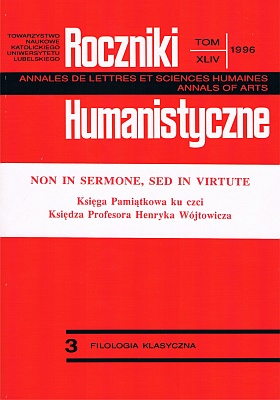The Germs of Christian Drama in Patristic Literature
Abstract
No drama (tragedy or comedy) was written throughout the patristic period (from the first to the eighth centuries) designed to be put on stage. It was the only literary genre which ancient Christianity did not accept. It is commonly said that Christian drama (created by Christians and based mainly on the Bible) took shape from the Liturgy as late as the eleventh century, and its first stage was liturgical drama, created in the period of 9th-10th centuries. The author seeks to prove that the origins of Christian drama should be searched earlier than that, i.e. in some patristic homilies dated back to the fifth and sixth centuries. He calls those homilies dramatic, and it is in them that he finds lively dialogues, monologues, soliloquies and apostrophes of the biblical figures. They all form the dramatic action.
The paper quotes, among other things, the definition of drama as formulated by Origen. According to the latter it is Song of Songs. The paper discusses also the structure of the dramatic patristic homilies. The author has found as many as 22, dividing them according to their content into three groups (the homilies about John the Baptist and the baptism of Christ, the homilies about Christ's descendance to the abyss and freeing the just, and the homilies about Annunciation and St. Joseph's doubts), as well as information about the lost dramatic writings of the bishop Apollinaris from Laodicea. Having made these general remarks, the author announces the particular part of the paper which has been published somewhere else. This being an analysis of particular patristic homilies (22) along with the dramatic elements.
Copyright (c) 1996 Roczniki Humanistyczne

This work is licensed under a Creative Commons Attribution-NonCommercial-NoDerivatives 4.0 International License.





